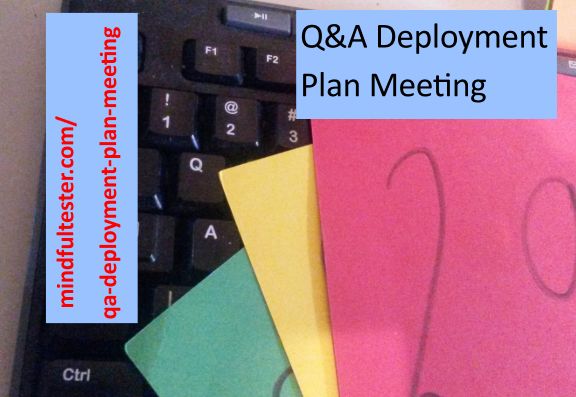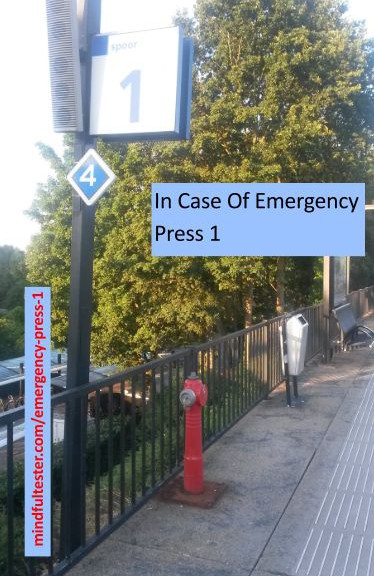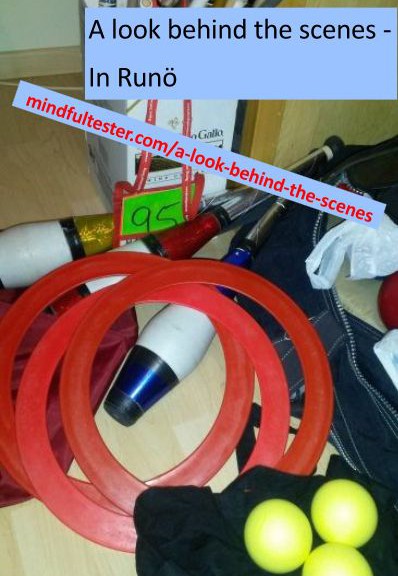[Note from the author: after some fact checking I discovered that I used the Red Card in a wrong way in this blog post. The red card must be used to raise issue like low volume or high temperature in the room, which can lower the quality of the gathering of information. For normal interruptions the yellow card should be used.
This basically means that I had to rewrite the blog post on certain points. This task was more complex than I had expected. The whole flow of arguments had to be restructured while preserving the spirit of this post. So I only added this note.]
Facilitator: Thank you reading “In Case Of Emergeny Press 1“. I’ve got green cards from numbers 95, 27, 38, and 23. Number 95, you can ask your question.
Attendee number 95: Did you consider Inspection according to Gilb and Graham?
Speaker: I am familiar with the Inspection according to Gilb and Graham. Frankly I did not consider this method. The question should be rephrased as
“Would you choose Inspection according to Gilb and Graham?”.
Looking backwards it is too far fetched. The people should receive proper training and there was just a block of few hours. Another disturbing element is mentioning the most biggest issues first. This can lead to a lot browsing forward and backward through the deployment plan. This can be quite disturbing.
Facilitator: Number 27, you can ask your question.
Attendee number 27: What was your role in the project?
Speaker: My role was a test coordinator.
Facilitator: I’ve got a yellow card from number 68. Number 68.
Attendee number 68: Why did you call for this meeting? It is not your task.
Speaker: I thought, that it was important. The next step is to make things happen: I planned in the meeting and I became the chairman.
Facilitator: There are no more yellow cards for this question on the stack. So we move on the next green card. Number 38.
Attendee number 38: Did the suppliers provide any deployment plans?
Speaker: All the suppliers provided deployment plans.
Attendee no 38: This looks like a time consuming operation. Was there any reluctance?
Speaker: One supplier did not see the benefits at first. Then he made a Deployment Plan after some talking.
Facilitator: At the moment I’ve got one green card from number 23. Number 23.
Attendee no 23: why did you need a deployment plan?
Speaker: I asked my test team the same question. One of the testers told me, that experience taught, that these plans were necessary. A few months before I personally witnessed a rollback.
Facilitator: we have a red card. Number 3.
Attendee no 3: What is a rollback?
Speaker: A rollback is, when the backup is restored. In this particular case also the old system was reinstalled.
Facilitator: we have a yellow card. Is it about the rollback? Okay. Number 17 go ahead.
Attendee no 17: Do you need to test it? The system, which was rolled back.
Speaker: Of course
Facilitator: There are no more yellow cards on the stack. I’ve got green cards from 54, 65, and 78. So number 54, you can ask your question.
Attendee no 54: Which format did you use for the Deployment Plan?
Speaker: I asked and got permission from one of the suppliers to use their Deployment Plan as a starting point. The advantage was, that it was familiar to the employees of this supplier.
Facilitator: I’ve got green cards from 65 and 78. So number 65.
Attendee no 65: Why do you call it an emergency? Nobody got hurt.
Speaker: How do you call a situation with a person cutting someone’s tent? And what would happen, if this person is caught in the act?
How do you call a situation with a system, which cannot be used right after the deployment?
Attendee no 65: [nods]
Facilitator: I’ve got green cards from numbers 78, 95 and 24. Number 78, you can ask your question.
Attendee no 78: Looking at your technical background it seems easy to be a chairman. Do you know everything?
Speaker: I do not know everything. I cannot know everything.
Attendee no 78: Did you not feel vulnerable?
Speaker: At certain points of the meeting I was vulnerable. Quite vulnerable. But I was also confident, that we could make a deployment plan as a group. Sometimes I had to ask for support and I got it.
Facilitator: No yellow cards. Number 95.
Attendee no 95: So technical knowledge and experience are not necessary?
Speaker: The important thing is to have a safe environment. A place, where people can voice their thoughts.
In order to discuss all actions I chose a business way of meeting. Please stick to facts. And we’re all here to accomplish something like a group.
I watched for body language. If I was not sure, then I stated the action, looked to the person and became silent.
Facilitator: I’ve got green cards from numbers 24, 38, and 23. Number 24, you can ask your question.
Attendee no 24: You added a new blog category: A leader ships. Did you ship? A Deployment Plan is just an artifact.
Speaker: I once read something along the line like System must solve the problem. If the deployment is bad, even the best system cannot solve a problem.
Facilitator: I’ve got green cards from numbers 38 and 23. Number 38, you can ask your question.
Attendee no 38: What have juggling and testing in common? You are talking about a hobby and job. These are two separate things for me.
Speaker: I have question in return: would you please summarise both stories in 4 words?
Attendee no 38: What about: good planning withstands emergency.
Speaker: So you plan the emergency?
Attendee no 38: I need some What If Scenarios, if things go wrong.
Speaker: So you want to make a scenario for every possible situation like overloaded network, a comet paying a visit, etcetera. There are a lot of scenarios to ponder upon. I suggest: Plan to anticipate emergency. In this case: complete rollback.
[To be continued here.]


